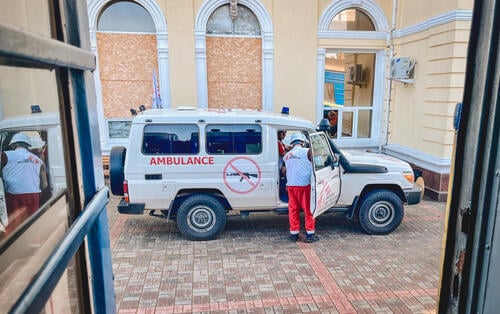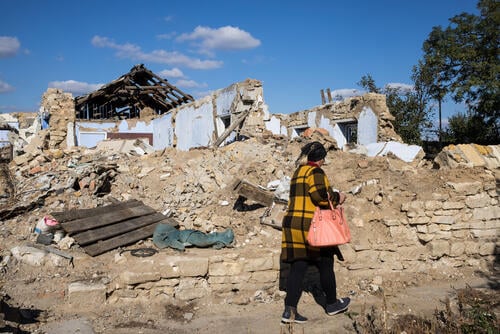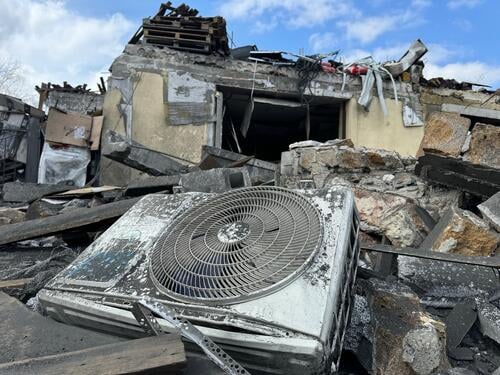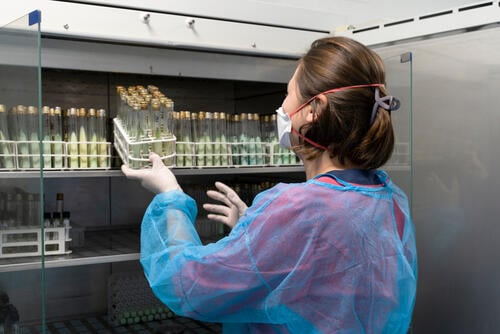Nataliia Pivovar, a doctor with Médecins Sans Frontières (MSF) on the medical train in Ukraine, shares her personal story with us. She is one of the MSF team members involved in evacuating patients from frontline areas to facilities in safer regions of Ukraine.
Another journey begins today. Nataliia feels confident and resilient because there was no shelling at night, so she managed to sleep. This is necessary because the next night will be almost sleepless. She will spend 36 hours on the train, caring for patients – most of whom are elderly people with dementia, cerebral palsy and other neurological disorders.
After each evacuation, there are patients whose eyes I remember for a long time. I ponder their stories, their paths, and destinies.Nataliia Pivovar, an MSF doctor
“I always wear two rings when I am on the train. This jewellery is simple, almost invisible on my hand, but when I need to relax or calm down, I roll the rings around my finger. It's such a small thing, but it connects me to home and gives me a sense of peace. It gives me strength.
We are preparing the train for the journey to Kherson. We've placed fresh linen on the beds and provided a hot kettle and lunch for each carriage. Ukrainian trains have lower and upper benches. This time, we are using only the lower ones. It's important for patients with psychiatric conditions to feel the floor under their feet. It makes them feel calmer and more at ease.”
When the train arrives, the sun is shining in Kherson. Patients are settled into the carriages, covering their eyes from the bright rays with their elbows while sitting in wheelchairs or on stretchers. Many of them have limited mobility and rarely went outside, primarily receiving treatment in special facilities. Nataliia notices that some people look confused.
“The frontline is very close and during the boarding process, shelling starts nearby, and explosions are heard. Some elderly people have hearing impairments, so they aren’t sure what is going on. They ask us if everything is alright. I have to reassure them, saying, ‘Everything is calm. It's important to get on the train now, and we will soon take you to a safe place.’”
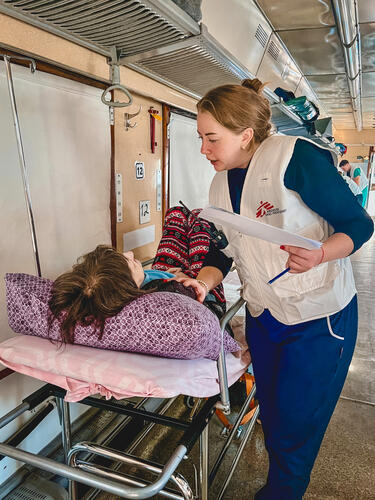
The journey is challenging. Doctors and nurses have to communicate with each patient, explaining where they are going and why. “People ask me if it will be safe at their new destination and if they will return. During these conversations I think about my own grandmother and how difficult it is for the elderly to change their surroundings and living conditions.”
Nataliia goes through one carriage with nine patients. Some need their blood pressure measured, some need medication, and others are connected to an oxygen station.
Nataliia steps out into the vestibule, standing alone, she twirls her rings, takes a deep breath, and then enters the next carriage with a smile. And so it goes on, carriage-by-carriage.
Each patient carries only a small bag with them, containing some clothes and documents. Among the 150 patients being evacuated, only a few have photographs – for most, all they have left are their memories. This is the first journey Nataliia can recall where people have only their most precious possessions. For many onboard, their other belongings were either destroyed when their homes were attacked, or they didn't have time to take anything, as they left amidst shelling.
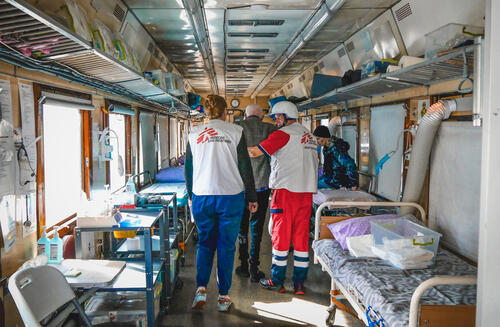
Creating a calm atmosphere throughout the carriage is very important. If one patient becomes anxious, it can affect the others. Nataliia and her colleagues make tea and serve lunch, which comforts the patients.
“After each evacuation, there are patients whose eyes I remember for a long time. I ponder their stories, their paths, and destinies.”
Among them is a 17-year-old boy from Kherson, who had cerebral palsy, impaired vision, and is unable to speak. At first, he is anxious on the train, fidgeting on his bed and growing increasingly distressed. Nataliia approaches him and gently starts talking to him, holding his hand.
“The boy touches my rings, and I tell him that everyone should find their own amulet in life. It could be anything – a necklace, a favorite cup, a handkerchief, a small stone. This little thing could save you from anxiety and loneliness. The boy calms down as I speak to him.”
Although he can't express it in words, Nataliia feels his gratitude.
Dr. Nataliia Pyvovar is from Kharkiv, which is located in the northeast of Ukraine. Before the full-scale invasion, she worked in an ambulance and in the pediatric intensive care unit of the Ministry of Health. She has been working as a doctor with Médecins Sans Frontières since June 2022.



